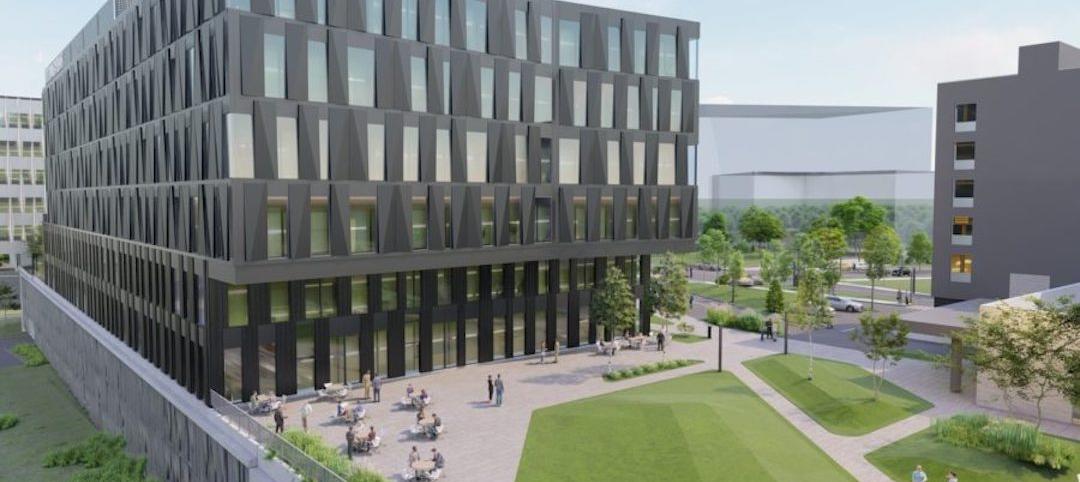Perkins Eastman and BLT Architects (BLTa) have recently announced their merger, effective February 1, 2022.
Perkins Eastman, which now has 1,100+ employees in 24 studios worldwide, has worked on projects on five continents in 60 countries. Its award-winning portfolio reflects expertise in healthcare, senior living, large-scale mixed use, higher education, K-12, hospitality, and workplace design as well as planning, urban design, and strategic consulting. BLTa, now known as “BLTa—A Perkins Eastman Studio,” has built an exceptionally strong integrated architecture and interior design firm of 41 professionals with deep roots in Philadelphia. With a studio in Pittsburgh for the last 27 years, Perkins Eastman has built a strong presence throughout Pennsylvania, especially in Western Pennsylvania. The addition of the BLTa studio strengthens the firm’s presence in the eastern part of the state as well. In merging with BLTa, Perkins Eastman enhances its expertise in mixed-use, multi-family residential, hospitality, workplace, higher education, historic renovations, adaptive reuse conversions, resorts and gaming, and transit-based projects.
“We are very pleased that BLTa has joined us and we now have a strong partner in Philadelphia. We have had the opportunity to get to know BLTa over the last several years and believe they bring significant skills and experience to our national practice. Moreover, we have always had important clients in Philadelphia, eastern Pennsylvania, and the adjacent states, and with BLTa we can now better serve those that want a combination of our national expertise combined with experienced local delivery and service,” says Brad Perkins, FAIA, chairman and co-founder of Perkins Eastman.
“We are thrilled to be merging with Perkins Eastman,” says Michael L. Prifti, FAIA, managing principal of BLTa, who joined the firm in 1982, back when it was known as Bower Lewis Thrower/Architects. “This union will give us the opportunity to serve our national clients in jurisdictions where we don’t currently practice. Perkins Eastman has new markets we’ve never touched. And with more feet on the ground, we can more easily and geographically serve our clients,” he says. Prifti also notes this merger will give BLTa’s architects and designers opportunities to diversify their projects and continue to grow as professionals.
Recent award-winning properties within the BLTa portfolio include: The Stephen Girard Building, where the firm revealed and preserved elegant design elements, integrating a 236-key Canopy by Hilton hotel within East Market, the one-million sf, ongoing transformation of a three square block area; The Bourse, a 380,000 sf adaptive reuse renovation of the first commodities exchange hall in the United States; and One City, an adaptive reuse project that converted an 1899 Renaissance Revival office building into a market-rate apartment building. Each of these properties won a Grand Jury 2021 Preservation Achievement Award given by the Preservation Alliance for Greater Philadelphia. The Stephen Girard Building and One City also won AIA Philadelphia Awards in the Historic Preservation/Adaptive Reuse Built category, and The Bourse won AIA Pennsylvania’s top prize – a Silver Medal. Hospitality Design magazine named Live! Casino and Hotel Philadelphia among the Best Hotel Openings of 2020. Live! Casino Pittsburgh, another BLTa design, also opened in 2020.
Shawn Basler, co-CEO and executive director of Perkins Eastman, notes that combining Perkins Eastman’s 40 years of global experience with BLTa’s 60 years of local expertise and relationships creates a powerful combination. “They’ll be able to draw on our well-established market credibility and resources, as well as geographic reach, while we’ll be able to tap into their deep knowledge of the Philadelphia metropolitan region along with their considerable expertise.”
Related Stories
Sponsored | Steel Buildings | Jan 25, 2022
Multifamily + Hospitality: Benefits of building in long-span composite floor systems
Long-span composite floor systems provide unique advantages in the construction of multi-family and hospitality facilities. This introductory course explains what composite deck is, how it works, what typical composite deck profiles look like and provides guidelines for using composite floor systems. This is a nano unit course.
Sponsored | Reconstruction & Renovation | Jan 25, 2022
Concrete buildings: Effective solutions for restorations and major repairs
Architectural concrete as we know it today was invented in the 19th century. It reached new heights in the U.S. after World War II when mid-century modernism was in vogue, following in the footsteps of a European aesthetic that expressed structure and permanent surfaces through this exposed material. Concrete was treated as a monolithic miracle, waterproof and structurally and visually versatile.
Urban Planning | Jan 25, 2022
Retooling innovation districts for medium-sized cities
This type of development isn’t just about innovation or lab space; and it’s not just universities or research institutions that are driving this change.
Sponsored | Resiliency | Jan 24, 2022
Norshield Products Fortify Critical NYC Infrastructure
New York City has two very large buildings dedicated to answering the 911 calls of its five boroughs. With more than 11 million emergency calls annually, it makes perfect sense. The second of these buildings, the Public Safety Answering Center II (PSAC II) is located on a nine-acre parcel of land in the Bronx. It’s an imposing 450,000 square-foot structure—a 240-foot-wide by 240-foot-tall cube. The gleaming aluminum cube risesthe equivalent of 24 stories from behind a grassy berm, projecting the unlikely impression that it might actually be floating. Like most visually striking structures, the building has drawn as much scorn as it has admiration.
Sponsored | Resiliency | Jan 24, 2022
Blast Hazard Mitigation: Building Openings for Greater Safety and Security
Coronavirus | Jan 20, 2022
Advances and challenges in improving indoor air quality in commercial buildings
Michael Dreidger, CEO of IAQ tech startup Airsset speaks with BD+C's John Caulfield about how building owners and property managers can improve their buildings' air quality.
Architects | Jan 17, 2022
OSPORTS adds Robert Hayes to lead operational and business development efforts
Hayes will guide the OSPORTS organization in its mission to offer a unique perspective to designing world-class facilities.
Architects | Jan 13, 2022
Hollywood is now the Stream Factory
Insatiable demand for original content, and its availability on a growing number of streaming platforms, have created shortages — and opportunities — for new sound stages.
Architects | Jan 13, 2022
Robert Eisenstat and Paul Mankins receive 2022 AIA Award for Excellence in Public Architecture
The award recognizes architects, public officials, or other individuals who design distinguished public facilities and advocate for design excellence.
3D Printing | Jan 12, 2022
Using 3D-printed molds to create unitized window forms
COOKFOX designer Pam Campbell and Gate Precast's Mo Wright discuss the use of 3D-printed molds from Oak Ridge National Lab to create unitized window panels for One South First, a residential-commercial high-rise in Brooklyn, N.Y.

















